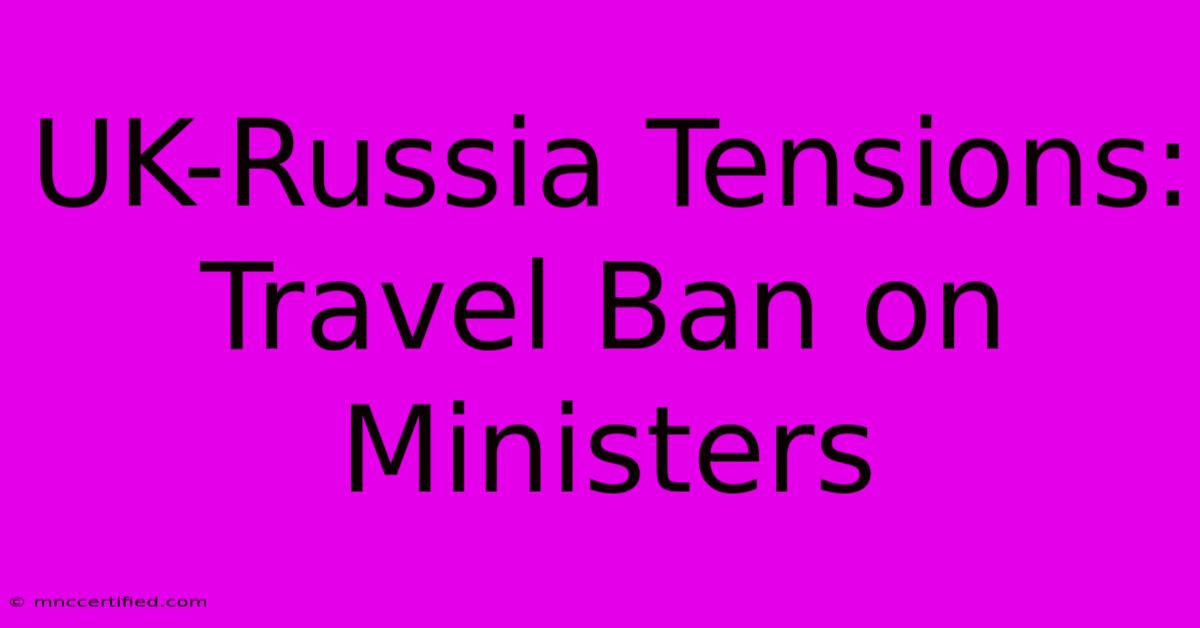UK-Russia Tensions: Travel Ban On Ministers

Table of Contents
UK-Russia Tensions Escalate: Travel Ban on Ministers
The UK's relationship with Russia has plummeted to new lows, marked by a significant escalation in tensions. A recently imposed travel ban on a number of Russian ministers has sent shockwaves through international relations, highlighting the deepening rift between the two nations. This article delves into the reasons behind this dramatic move, its implications for UK-Russia relations, and the broader geopolitical context.
The Catalyst: Allegations of Human Rights Abuses
The travel ban, a significant diplomatic tool, stems from allegations of widespread human rights abuses within Russia. Specifically, the UK government has cited the poisoning of Alexei Navalny, the imprisonment of political opponents, and the ongoing conflict in Ukraine as key factors in its decision. These actions, according to the UK, represent a blatant disregard for international law and fundamental human rights. The sanctions are designed to hold the responsible individuals accountable and to signal the UK's unwavering commitment to defending human rights globally.
Who is Affected by the Travel Ban?
The ban targets a select group of high-ranking Russian ministers, individuals directly implicated in, or perceived to be complicit in, the alleged human rights violations. While the precise list of individuals affected is constantly updated and subject to change, the ban notably includes those holding significant power within the Russian government. The aim is to exert pressure on the Kremlin by directly impacting key decision-makers. This targeted approach contrasts with broader economic sanctions, focusing instead on individual accountability.
Implications for UK-Russia Relations
The travel ban significantly deteriorates the already fragile relationship between the UK and Russia. It represents a substantial escalation in diplomatic tensions and signals a hardening of the UK's stance towards Russia's actions. This move is likely to provoke a retaliatory response from Russia, potentially leading to further restrictions and impacting other areas of bilateral cooperation, such as trade and cultural exchange. The long-term implications for UK-Russia relations remain uncertain, but a prolonged period of strained relations seems highly probable.
The Broader Geopolitical Context
The UK's actions are not isolated but reflect a broader international response to Russia's behavior. Many Western nations share similar concerns about human rights abuses and the ongoing conflict in Ukraine. The travel ban aligns with a concerted effort by the international community to pressure Russia to change its course. This coordinated approach underscores the gravity of the situation and the collective determination to hold Russia accountable for its actions on the global stage. The situation mirrors similar tensions experienced between the West and other authoritarian regimes, highlighting the ongoing struggle for international human rights norms.
Looking Ahead: What's Next?
The future of UK-Russia relations remains uncertain in the wake of this travel ban. The potential for further escalation remains high, and the effectiveness of this diplomatic tool in achieving the desired outcome is yet to be seen. Ongoing monitoring of the situation is crucial to understand the full implications of this significant development. Experts predict that the tensions will continue to exert pressure on international diplomacy and global security. The international community will closely scrutinize the evolving situation and its potential impact on regional stability.
Keywords: UK, Russia, tensions, travel ban, ministers, human rights, sanctions, geopolitical, conflict, Ukraine, Alexei Navalny, diplomacy, international relations, Western sanctions, Russia sanctions, UK foreign policy.
SEO Strategy: This article employs a strategic keyword distribution, incorporating both primary and related terms. The use of headers and subheadings ensures optimal readability and search engine optimization. Off-page SEO would involve promoting this article through social media channels, relevant forums, and guest blogging opportunities on related websites focused on international affairs and politics. Building backlinks from high-authority domains is crucial for enhancing search engine rankings.

Thank you for visiting our website wich cover about UK-Russia Tensions: Travel Ban On Ministers. We hope the information provided has been useful to you. Feel free to contact us if you have any questions or need further assistance. See you next time and dont miss to bookmark.
Featured Posts
-
Landlords Petition A Second General Election
Nov 27, 2024
-
Pressure Forces Walmart Dei Changes
Nov 27, 2024
-
One Day Bounce House Insurance
Nov 27, 2024
-
Can Arsenal Win Champions League
Nov 27, 2024
-
Uk Diplomat Expelled Russias Accusation
Nov 27, 2024